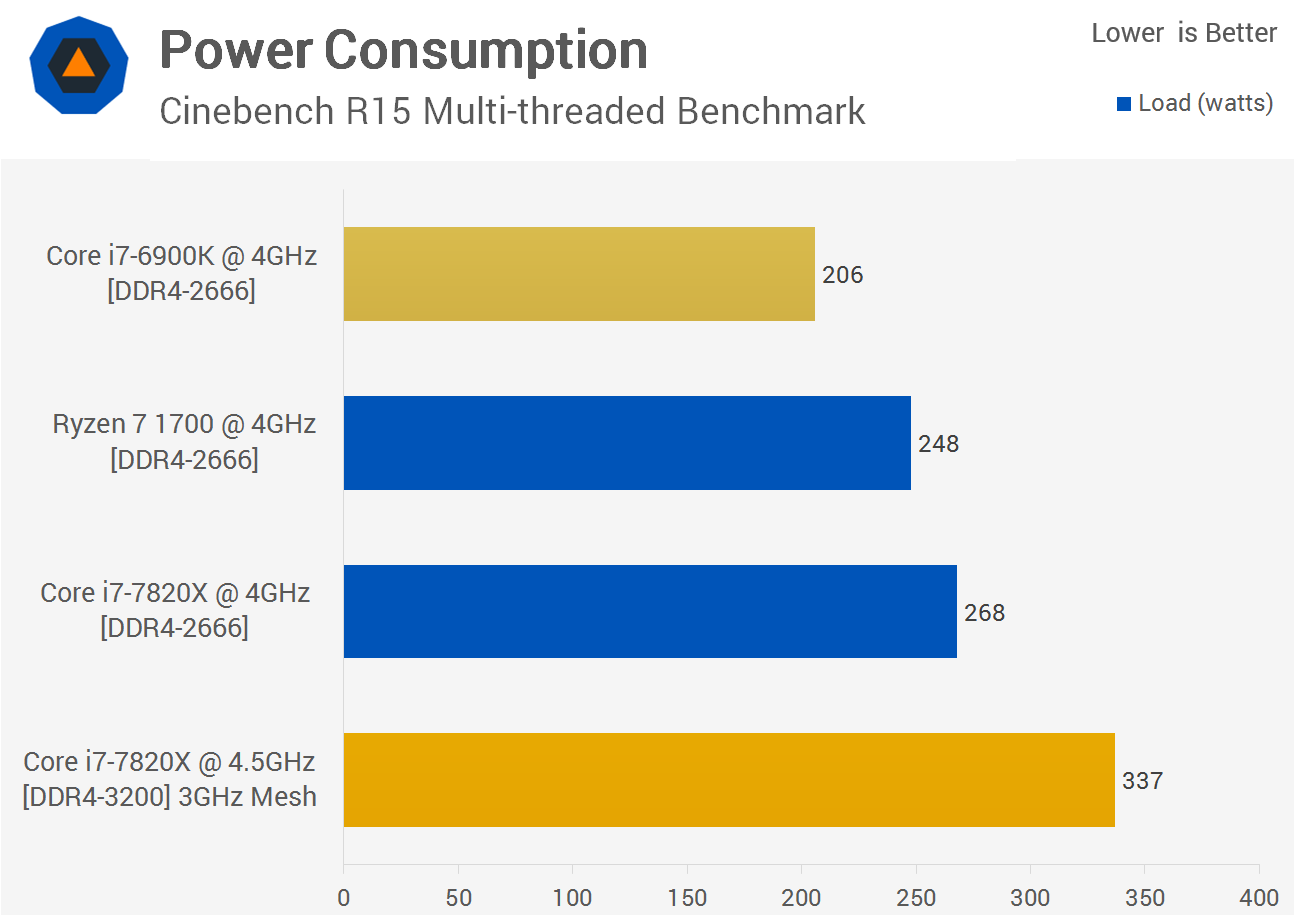Power Consumption & The Verdict

Since memory frequency has little to no impact on overall system power consumption, I only included the 2666 RAM figures here along with the 7820X's 4.5GHz overclock.
Clock-for-clock, the Core i7-6900K was very efficient pushing total system consumption to just 206 watts in Cinebench R15's multi-threaded test. The Ryzen 7 1700 also performed well at 248 watts while the 7820X was a bit hungrier, hitting 268 watts.
Once overclocked to 4.5GHz, the 7820X increased total system consumption by 26% and pulled 36% more power than the R7 1700.
Closing Thoughts
We have some interesting results to discuss. Let's start with the Core i7-6900K and 7820X.
It was shocking to find that when comparing clock-for-clock performance using the same memory speed on both setups, the older 6900K was faster in every single game we tested and significantly so in titles such as Civilization IV. Even if we give the 7820X the advantage of having faster DDR4-3200 RAM, which the 6900K doesn't support, it was rare for the Skylake-X CPU to take the lead.
When overclocked to 4.5GHz with a 3GHz mesh frequency, the 7820X was still only able to match the 6900K in most of the titles tested and realistically we could have squeezed a few hundred MHz more out of the Broadwell-E CPU. Adding insult to injury, the 7820X consumes significantly more power to deliver similar performance of the previous generation part, not to mention that you can expect to require a high-end liquid cooling setup to achieve the 7820X's 4.5GHz overclock without heavy throttling.
When it came to application performance, the 7820X did look much better, though even then it wasn't always superior to the 6900K. For example, we saw similar performance in 7-Zip, while Cinebench R15's numbers weren't drastically different. The 7820X was marginally better in our Blender and Corona tests but not to the degree where you would find yourself getting excited about the results.
The only advantage the 7820X has over the 6900K is the fact that it's around 35% cheaper ($600 versus $1,050). That's obviously a big deal, but if you made me choose between these two CPUs at the same price, I'd probably take the 6900K.
At $290, it's pretty clear that the Ryzen 7 CPU is in a different league when it comes to value and I don't think the most loyal Intel fanboy could argue otherwise. Factoring in the cost of a motherboard ($220+ versus ~$100), the 7820X is around 130% more expensive than the R7 1700, and of course it was never anywhere near that much faster.
When comparing the R7 1700 against the 7820X in terms of maximum overclocked gaming performance, the results were much the same overall. The 7820X enjoyed a win in Hitman while the R7 1700 was noticeably better in Civilization IV and the rest of the games were largely a wash. However, the 7820X was 23% faster in Blender and 16% faster in Corona, so it was hands down faster for these workloads, just not 130% faster, and to achieve that extra performance it consumed 36% more power.
Shopping shortcuts:
- Ryzen 7 1700 on Amazon, Newegg
- Intel Core i7-7820X on Amazon, Newegg
- Intel Core i7-6900K on Amazon, Newegg
In the end, the Skylake-X architecture is at best a side-step from Broadwell-E and this has afforded Ryzen a great deal of breathing room. If Intel were even the slightest bit aggressive with its pricing then Ryzen would have a serious fight on its hands, but it currently seems crazy to spend $600 on the 7820X when you can get comparable performance for less than half the price.
